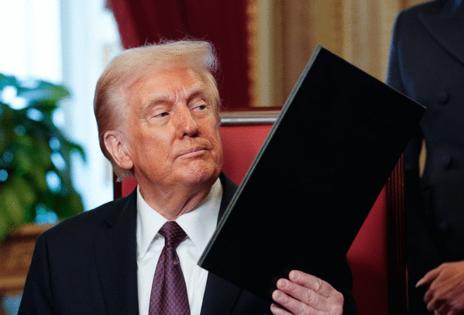Trump calls for Senate 'nuclear option' to end government shutdown
Published in News & Features
WASHINGTON — President Donald Trump late Thursday called for Senate Republicans to end the partial government shutdown by using the so-called “nuclear option” to eliminate the legislative filibuster.
Trump posted on his Truth Social platform that Democrats “want Trillions of Dollars to be taken from our Healthcare System and given to others, who are not deserving — People who have come into our Country illegally, many from prisons and mental institutions. This will hurt American citizens, and Republicans will not let it happen. It is now time for the Republicans to play their ‘TRUMP CARD,’ and go for what is called the Nuclear Option — Get rid of the Filibuster, and get rid of it, NOW!”
Trump argued that a future Senate Democratic majority would take the step anyway by changing the threshold to limit debate on legislation from 60 votes to a simple majority, and Republicans should thus take advantage of their current position to act and pass a government funding bill. Trump mentioned the opposition from then-Sens. Joe Manchin III of West Virginia and Kyrsten Sinema of Arizona to the rules changes during the last Democratic majority. Both have since left Congress.
“If the Democrats ever came back into power, which would be made easier for them if the Republicans are not using the Great Strength and Policies made available to us by ending the Filibuster, the Democrats will exercise their rights, and it will be done in the first day they take office, regardless of whether or not we do it,” Trump said.
Trump also said in his post that the shutdown came up repeatedly on his just-concluded trip to Asia.
“The one question that kept coming up, however, was how did the Democrats SHUT DOWN the United States of America, and why did the powerful Republicans allow them to do it?” Trump said. “The fact is, in flying back, I thought a great deal about that question, WHY?”
The shutdown is now fully on track to surpass the record set in Trump’s first term, when a partial shutdown lasted 35 days, from December 2018 to January 2019. Republicans in both the House and Senate, as well as the administration, continue to insist that the onus is on Senate Democrats to advance a House-passed continuing resolution that would, at this point, reopen the government for about three weeks.
The open enrollment period for health insurance plans under the 2010 health care law begins on Saturday, and Democrats continue to seek a path forward for extending the expanded tax credit subsidies to effectively avoid large premium increases. It was still unclear Thursday afternoon, as the Senate left for the weekend, whether more centrist Democrats would find a compromise on a path forward allowing the government to reopen, possibly after Tuesday’s elections in New Jersey, Virginia and elsewhere. But talks did appear to be gaining steam during the week.
A Washington Post/ABC News/Ipsos poll released Thursday found 45% blaming Trump and congressional Republicans for the shutdown, compared with 33% blaming congressional Democrats. Those numbers have not moved much since the shutdown began.
Senate GOP has long opposed
The idea of eliminating the legislative filibuster has not been popular among Senate Republican leadership, including when it came up repeatedly in Trump’s first term. Back in the spring of 2017, then-Senate Majority Leader Mitch McConnell, R-Ky., pledged not to change the legislative threshold during his time in the office.
“There’s no sentiment to change the legislative filibuster,” McConnell said, and the supermajority requirement to invoke cloture on legislation has remained intact to date under both Republican and Democratic majorities.
Similarly, Majority Leader John Thune, R-S.D., made his views on the legislative filibuster clear during his opening floor speech as leader in January.
“One of my priorities as leader will be to ensure that the Senate stays the Senate,” Thune said on Jan. 3. “That means preserving the legislative filibuster — the Senate rule that today has perhaps the greatest impact in preserving the founders’ vision of the Senate.”
There had been less public pressure on Senate Republicans to gut the filibuster this Congress, perhaps in part because they accomplished much of their legislative agenda through a sweeping budget reconciliation law, but the ongoing lapse in appropriations has started to increase the calls for using the “nuclear option.” Trump’s interest will likely amplify that once again.
©2025 CQ-Roll Call, Inc., All Rights Reserved. Visit cqrollcall.com. Distributed by Tribune Content Agency, LLC.







Comments